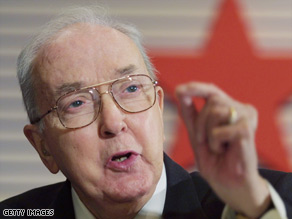Jesse Helms, a North Carolina Republican who became an icon to conservatives,
died Friday at age 86, the Jesse Helms Center said.

Former U.S. Sen. Jesse
Helms, R-North Carolina, was hailed as a leader of the conservative movement.
Helms once said his job was to derail the freight train of
liberalism.
Conservatives admired him for his opposition to abortion and
what he called "indecent art," while liberals accused him of using race as a
wedge issue to defeat black opponents.
Helms opposed civil rights and a holiday honoring the Rev.
Martin Luther King Jr. He was one of a small number of senators who opposed
extending the Voting Rights Act in 1982, eventually giving up a filibuster when
then-Majority Leader Sen. Howard Baker, a Tennessee Republican, said the Senate
would not take up any other business until it acted on the extension.
But Helms wrote in his 2005 memoir "Here's Where I Stand"
that he was "not the least bit racist," the New York Times wrote in a review of
the book.
The Jesse Helms Center, a private foundation in Wingate,
North Carolina, announced on its Web site that Helms died at 1:15 a.m. Friday in
Raleigh.
"Today we lost a senator whose stature in Congress had few
equals," said Sen. Mitch McConnell of Kentucky, the Senate's Republican leader.
"Sen. Jesse Helms was a leading voice and courageous champion for the many
causes he believed in."
White House spokesman Scott Stanzel said, "America lost a
great public servant and true patriot today."
The cause of death has not been announced. Helms had been ill in recent years.
Helms retired in 2003 after serving five terms in the
Senate.
At the time, President Bush said the Senate was "losing an
institution."
"Sen. Helms has been a tireless defender of our nation's
freedom and a champion of democracy abroad," Bush said.
Helms' hometown newspaper, The (Raleigh) News &
Observer, lionized him in 2001 as one of the creators of the modern Republican
Party.
"Helms helped broaden the party to include religious
conservatives and people who drank not just Chablis but sweet tea, and who drove
not just BMWs but pickup trucks," the paper wrote when he announced he was going
to retire.
"In doing so, Helms played a pivotal role in moving the
Republican Party to the right -- changing the GOP from the party of Gerald Ford
and Nelson Rockefeller to the party of Ronald Reagan and Newt Gingrich."
When the GOP was the majority party in the Senate, Helms was
chairman of the powerful Foreign Relations Committee, consistently moving U.S.
policy toward the right, especially regarding the United Nations and Cuba.
Helms was such a polarizing figure in American politics that
both the left and the right invoked his name in fund-raising appeals.
"The business of political causes and issues is a lot like
professional wrestling -- there is good and there is evil. And Jesse Helms, to
those of us on the left, is evil," Roger Craver, a leading direct-mail
fund-raiser for the left, told CNN in 2001 when Helms announced his
retirement.
Helms was instrumental in blocking the payment of U.S. dues
to the United Nations in an effort to force changes in the world organization.
The United States withheld up to $1 billion under a law that came to be known as
the Helms-Biden Act. The law demanded reforms of U.N. bureaucracy and a
reduction in Washington's contributions to the U.N. peacekeeping budget and
general budget.
He also helped prevent the Senate from ratifying the
Comprehensive Test Ban Treaty despite appeals from President Clinton.
He also held seats on the Agriculture Committee, looking out
for North Carolina's extensive tobacco industry, and on the
Senate Rules and Administration Committee.
Ed Feulner, president of conservative think tank the
Heritage Foundation, hailed Helms as "one of the most consequential figures of
the 20th century."
"Along with Barry Goldwater and Ronald Reagan, he helped
establish the conservative movement and became a powerful voice for free markets
and free people," Feulner wrote.
"The defeat of Soviet communism and the rise of Ronald
Reagan would not have happened without his intrepid leadership at decisive
times."
Helms was known as "Senator No" for his staunch opposition
to an array of liberal causes, including affirmative action, arts funding and
gay rights.
"The destruction of this country can be pinpointed in terms
of its beginnings to the time that our political leadership turned to
socialism," Helms said in an editorial he wrote at WRAL-TV in Raleigh, according
to The Associated Press.
"They didn't call it socialism, of course. It was given
deceptive names and adorned with fancy slogans. We heard about New Deals, and
Fair Deals and New Frontiers and the Great Society."
Helms was accused of race-baiting throughout his career.
"To rob the Negro of his reputation of thinking through a
problem in his own fashion is about the same as trying to pretend that he
doesn't have a natural instinct for rhythm and for singing and dancing," he
wrote in 1956, according to the AP.
Helms faced challenges to his Senate seat from Democrat
Harvey Gantt, the black former mayor of Charlotte, North Carolina, in 1990 and
1996.
In the first election, Helms ran a television commercial
that showed a pair of white hands crumpling a pink slip as the announcer said:
"You needed that job, and you were the best qualified, but they had to give it
to a minority, because of a racial quota. Is that really fair? Harvey Gantt says
it is. Gantt supports Ted Kennedy's racial quota law that makes the color of
your skin more important than your qualifications."

In later years, Helms worked with Clinton's secretary of
state, Madeleine Albright, and U2 singer Bono to fight AIDS in Africa.
At 80, Helms had an operation to replace a
faulty prosthetic heart valve put in place a decade earlier when he had
quadruple-bypass surgery.


